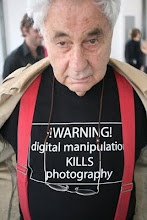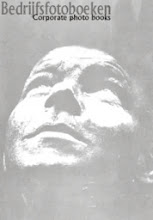"The Tireless Epic"
2 October 2010 - 9 January 2011
Their personal universe and love of women were the starting points for an incessant stream of images showing the world as they saw it. All three were trained artists but entirely self-taught as photographers. This autumn, the Hague Museum of Photography is showing the work of a trio of eccentrics regarded by the photographic world as ‘outsiders’: Dutchmen Gerard Petrus Fieret and Anton Heyboer plus Czech artist Miroslav Tichý. The three are linked not only by their chosen themes, but also by an obstinately idiosyncratic way of life. This exhibition brings their highly singular worlds together. Its title, The Tireless Epic, comes from a poem written by Fieret.
Gerard Petrus Fieret (1924-2009) studied drawing and painting at the Royal Academy of Art (KABK) in The Hague immediately before and after the Second World War. From the mid-60s through to about 1980, however, he devoted his energies mainly to photography, a medium that enabled him to show off all his creative talents. Over that period he produced a constant and well-nigh obsessive stream of black and white photographs. He snapped whatever he saw around him: himself, girls, children, animals and street scenes. And women, lots of women. He photographed them during casual encounters, frequently catching them in uninhibited, intimate poses which give the pictures a slightly voyeuristic feel.
Gerard Fieret Boundless Shoreless Unlimited Photography | Promote Your Page Too

The work of Miroslav Tichý (b. 1926) is regarded as one of the most interesting photographic discoveries of the last decade. In the brave new world of digital photography, Tichý’s mysterious oeuvre – consisting of blurred photographs of women taken at a distance, sometimes surreptitiously, using ramshackle home-made cameras – is regarded as the last, magnificent death throe of the age of analogue photography, which dated right back to 1839. Although Tichý has not set foot outside his home town of Kyjov (Moravia) for the last half century, recent years have seen major retrospectives of his work at the Centre Pompidou in Paris and the ICP in New York.
Anton Heyboer (1924-2005) is better known for his paintings and unconventional commune-based lifestyle than for his photography. Following the horrors of the Second World War, he resolved to turn his back on society. He established a commune, where he lived entirely according to his own rules, achieving a highly productive artistic life with the support of his four ‘wives’. This exhibition focuses on the black and white photographs taken by Heyboer in the 1970s to document his day-to-day life at the commune in Den Ilp, where he lived until his dying day.
The exhibition will include photographs, negatives, cameras and sculptures, as well as continuous showings of three documentary films: Photo & Copyright by G.P. Fieret (Frank van den Engel, 2009),Miroslav Tichý: Tarzan Retired (Roman Buxbaum, 2008) and Anton Heyboer: in kleur bij God thuis (Frank Wiering, 1974).
Gerard Petrus Fieret (1924-2009) studied drawing and painting at the Royal Academy of Art (KABK) in The Hague immediately before and after the Second World War. From the mid-60s through to about 1980, however, he devoted his energies mainly to photography, a medium that enabled him to show off all his creative talents. Over that period he produced a constant and well-nigh obsessive stream of black and white photographs. He snapped whatever he saw around him: himself, girls, children, animals and street scenes. And women, lots of women. He photographed them during casual encounters, frequently catching them in uninhibited, intimate poses which give the pictures a slightly voyeuristic feel.
Gerard Fieret Boundless Shoreless Unlimited Photography | Promote Your Page Too

The work of Miroslav Tichý (b. 1926) is regarded as one of the most interesting photographic discoveries of the last decade. In the brave new world of digital photography, Tichý’s mysterious oeuvre – consisting of blurred photographs of women taken at a distance, sometimes surreptitiously, using ramshackle home-made cameras – is regarded as the last, magnificent death throe of the age of analogue photography, which dated right back to 1839. Although Tichý has not set foot outside his home town of Kyjov (Moravia) for the last half century, recent years have seen major retrospectives of his work at the Centre Pompidou in Paris and the ICP in New York.
Anton Heyboer (1924-2005) is better known for his paintings and unconventional commune-based lifestyle than for his photography. Following the horrors of the Second World War, he resolved to turn his back on society. He established a commune, where he lived entirely according to his own rules, achieving a highly productive artistic life with the support of his four ‘wives’. This exhibition focuses on the black and white photographs taken by Heyboer in the 1970s to document his day-to-day life at the commune in Den Ilp, where he lived until his dying day.
The exhibition will include photographs, negatives, cameras and sculptures, as well as continuous showings of three documentary films: Photo & Copyright by G.P. Fieret (Frank van den Engel, 2009),Miroslav Tichý: Tarzan Retired (Roman Buxbaum, 2008) and Anton Heyboer: in kleur bij God thuis (Frank Wiering, 1974).

















Geen opmerkingen:
Een reactie posten